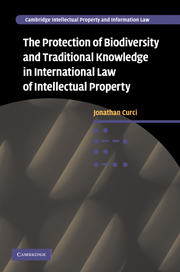Book contents
- Frontmatter
- Contents
- List of abbreviations
- Acknowledgments
- Part I The main problems
- Part II The protection of genetic resources in intellectual property law
- Part III The protection of traditional knowledge in the international patent system
- 4 Towards clearer legal definitions
- 5 The construction of an access- and benefit-sharing regime and intellectual property issues: criteria and options
- 6 The defensive protection of traditional knowledge in international patent law
- 7 Positive protection of traditional knowledge
- 8 Final observations
- Index
- Cambridge Cultural Social Studies
- References
5 - The construction of an access- and benefit-sharing regime and intellectual property issues: criteria and options
from Part III - The protection of traditional knowledge in the international patent system
Published online by Cambridge University Press: 04 August 2010
- Frontmatter
- Contents
- List of abbreviations
- Acknowledgments
- Part I The main problems
- Part II The protection of genetic resources in intellectual property law
- Part III The protection of traditional knowledge in the international patent system
- 4 Towards clearer legal definitions
- 5 The construction of an access- and benefit-sharing regime and intellectual property issues: criteria and options
- 6 The defensive protection of traditional knowledge in international patent law
- 7 Positive protection of traditional knowledge
- 8 Final observations
- Index
- Cambridge Cultural Social Studies
- References
Summary
This section explores an ABS regime in accordance with the mandated provisions of the relevant international legal instruments and the major policy options that States and the international community can follow.
While in other fields of IP law, one can avail oneself of comparable experiences, I do not know of any analogy in establishing an access regime. For instance, when shaping new types of protection like the neighboring rights of phonogram producers, of software, or of the sui generis protection of databases, one would resort to copyright and other sui generis regimes as paradigms to follow or to depart from according to the circumstances. In contrast, some of the possible suggestions aiming at protecting TK and GRs originally stem from IP law, e.g. the CBD and the ITPGFRA legal regimes. Here resides the difficulty in spelling out an IP system inspired by non-IP standard concepts and non-IP parallel implementation regimes.
In this endeavor, the concept of mutual supportiveness plays a pivotal role as do all the other rules of interpretation of applicable treaties and the rules for solving conflicting provisions.
The bilateral correspondence of the efforts on the part of biodiversity recipient and provider countries is absolutely indispensable for ensuring that the system is functional. These efforts consist of adopting and enforcing rules aimed at guaranteeing compliance with biodiversity provider rules regarding access in connection with the grant of IP protected innovations incorporating GRs originating from provider countries.
- Type
- Chapter
- Information
- The Protection of Biodiversity and Traditional Knowledge in International Law of Intellectual Property , pp. 103 - 130Publisher: Cambridge University PressPrint publication year: 2009



